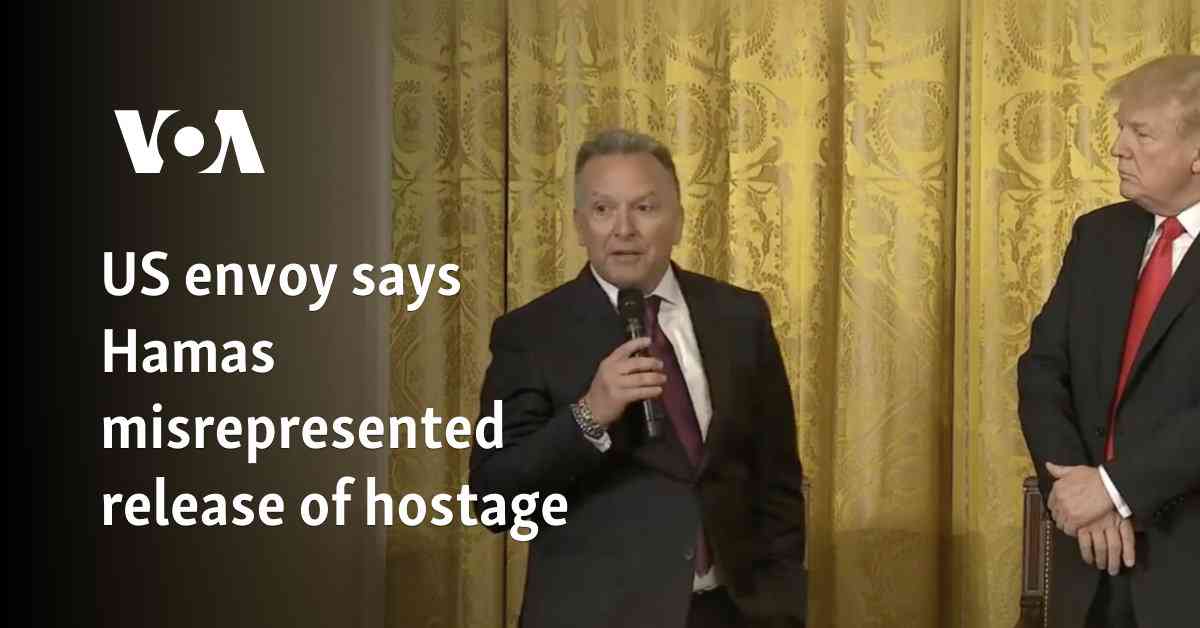US Diplomat Slams Hamas for Manipulating Hostage Release Announcement
U.S. special envoy for the Middle East, Steve Witkoff, has criticized Hamas for misrepresenting the circumstances of a potential release of an American-Israeli soldier. The Hamas statement issued on Friday claiming to agree to release Edan Alexander, the alleged last American hostage held in Gaza, was actually a condition tied to a proposed “bridge” ceasefire initiative by U.S. officials earlier in the week.
The Controversial Hamas Statement
The U.S.-designated terrorist group, Hamas, released a statement early Friday suggesting their agreement to release Edan Alexander and the bodies of four other hostages after receiving an offer from mediators to resume negotiations for the second phase of a Gaza ceasefire agreement. The proposal was supposedly presented by unidentified mediators during the ceasefire talks facilitated by the United States, Egypt, and Qatar.
In their statement, Hamas expressed full readiness to engage in negotiations aimed at achieving a comprehensive agreement for the second phase of the ceasefire. However, the subsequent response from Witkoff’s office highlighted a disconnect between the public posturing and the private demands of Hamas, which the diplomat described as unrealistic without a permanent ceasefire in place.
The Implications and Responses
The joint statement issued by Witkoff and the National Security Council outlined a bridge proposal to extend the existing ceasefire beyond religious holidays like Ramadan and Passover. The extension would provide more time for critical humanitarian aid to reach Gaza and facilitate the potential release of additional living hostages by Hamas in exchange for prisoners.
Despite Israel’s acceptance of the Witkoff framework, the ongoing psychological warfare against hostage families by Hamas continues to strain the delicate negotiations. Israeli Prime Minister Benjamin Netanyahu’s office revealed plans to convene a ministerial team for a comprehensive briefing on the situation, emphasizing the urgency of freeing the hostages and achieving strategic goals.
The complex dynamics of the ceasefire negotiations have been further complicated by Hamas’ insistence on advancing to the second phase of the agreement, which conflicts with Israel’s preference for extending the current phase. The standoff underscores the deep-rooted tensions and challenges in reaching a lasting resolution to the conflict.
In earlier remarks to FOX Business News, White House Press Secretary Karoline Leavitt underscored the cautious approach to Hamas statements while reaffirming President Donald Trump’s unwavering commitment to bringing American hostages home. Witkoff’s persistent advocacy for the release of Edan Alexander underscores the administration’s prioritization of securing the safe return of all captured individuals.
The situation is further complicated by the history of violence and animosity between Hamas and Israel, dating back to the 2023 attack that triggered the ongoing conflict. With 24 living hostages still held by Hamas, along with the remains of numerous individuals killed in previous clashes, the stakes remain high for all parties involved.
In conclusion, the evolving dynamics of the ceasefire negotiations highlight the intricate challenges of diplomacy in the conflict-ridden Middle East. As global attention remains focused on the fate of the hostages and the prospects for a lasting peace agreement, the delicate balancing act between competing interests underscores the critical need for continued dialogue and engagement to avert further escalation and human suffering.














